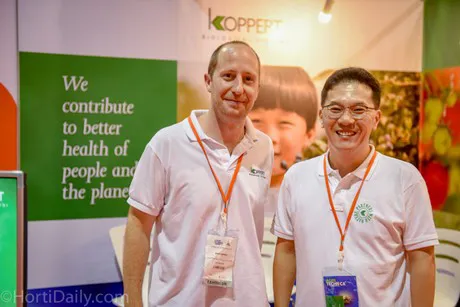The adaptation of biological crop protection in Southeast Asia is taking off at a slow, but steady pace. According to Bram Koppert of Koppert Biological Systems, it requires some time, but it will develop. "Biological crop protection will eventually become very important here, for both conventional and organic farmers."
Bram Koppert is the Area Manager for Koppert Biological Systems in Asia Pacific. He explains that the Dutch company has a strong presence in Northeast Asia for a number of years now. "We are active in Japan for 25 years, in Korea we are present for more than 20 years and over the last decade we have increased our presence in China too. We are strongly represented through our own local branches and distributors. As well as this, we are looking at the opportunities in Southeast Asia, where the tropical climate brings in an extra challenge."
Bram Koppert and Jindoo Kang of Koppert Biological Systems at the 2017 Horti Asia in Bangkok, Thailand.
According to Bram, Southeast Asia is a promising market for the introduction of biological and organic cropping methods. Also here, farmers and growers have come to a point that spraying chemicals and synthetic fertilizers are no longer a perfect solution. The organic approach is required to restore the environment. "While it demands a lot of patience, we are investing in this area by means of consultation and education. This is of paramount importance to gain ground with our biological solutions."
Bram explained that almost everyone has a mobile phone these days, which makes it more easy to share information. "Thanks to the smartphone, a lot of Asian farmers and growers have access to the internet these days. This makes it easy for them to obtain knowledge and learn how to improve certain things. This has a very positive effect on the adaptation of sustainable practices, as growers have a lot of technical information at their fingertips."
Koppert also organizes international webinars from their Dutch offices and has various apps available in multiple languages to support farmers with the use of their biological crop protection and systems. "Our products are useless if you do not know how to use them. Therefore we have staff available to train, and educated growers in the field, too."
Will this mean that the Asian growers will largely adopt the biological systems like beneficial insects and organic soil enhancers within the next decade? Probably not. "The first step will be the use of bumblebees to pollinate crops. This is slowly taking off now in the Chinese solar greenhouses. While there is some adoption of other biological control systems, it requires more time to take the next step. We need to change the mentality and show that you can do things in a different way."
Looking to the future, Koppert does expect farmers to slowly adapt. He also sees that there is a market for organic crops. "China already has a relatively large marketplace for organic products. The problem with these products, however, is that many people do not trust them. Consumers know that it might be a little bit better or safer than the standard offer, but as there is no strict enforcement on organic certification there is no broad public trust."
Since two years some changes have appeared on the horizon. "There are now a few organic farms in Asia that grow genuine organic crops and market them under their own private brands and labels. There is a huge market for these products thanks to a growing rich middle class that is willing to pay for safer organic produce. This is a good development, also for us, of course."



